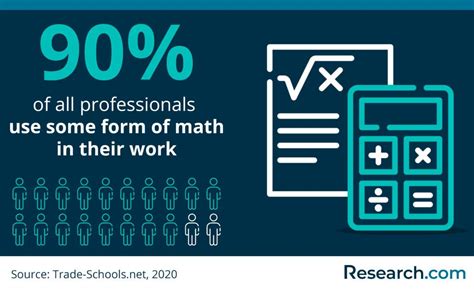Algebra is an essential branch of mathematics that finds application in various fields across industries. Its use extends beyond academic institutions, as it plays a crucial role in many practical applications. In this article, we explore the wide array of careers that utilize algebra and delve into the specific applications within each profession.

Careers in Engineering
Algebra serves as a foundational tool for engineers of all disciplines. From civil to electrical and mechanical engineering, the ability to manipulate algebraic equations and solve complex problems is indispensable.
1. Civil Engineer: Civil engineers design, build, and maintain infrastructure such as roads, bridges, and buildings. Algebra helps them calculate forces, stresses, and materials needed for safe and efficient structures.
2. Electrical Engineer: Electrical engineers specialize in designing and developing electrical systems and devices. Algebra plays a vital role in analyzing circuits, calculating power flow, and optimizing electrical efficiency.
3. Mechanical Engineer: Mechanical engineers create and analyze mechanical systems, from engines to robotics. Algebra aids in understanding forces, motion, and energy conversion within these systems.
Careers in Science
Algebra is extensively used in the natural and physical sciences to quantify and model various phenomena. Researchers and scientists rely on algebraic techniques to solve complex problems and make predictions.
1. Physicist: Physicists study the fundamental laws and principles that govern the universe. Algebra is essential for deriving equations of motion, solving quantum mechanics problems, and analyzing data.
2. Statistician: Statisticians collect, analyze, and interpret data to draw meaningful conclusions. Algebra enables them to create statistical models, calculate probabilities, and test hypotheses.
3. Astronomer: Astronomers explore celestial objects and their behavior. Algebra aids in calculating orbits, predicting stellar evolution, and analyzing astronomical data.
Careers in Finance and Business
Algebraic concepts are widely employed in finance and business to analyze data, forecast trends, and make informed decisions.
1. Financial Analyst: Financial analysts evaluate investments and make recommendations to clients. Algebra enables them to build financial models, calculate risk, and predict future cash flows.
2. Actuary: Actuaries assess and manage financial risks. Algebra helps them model insurance policies, calculate premiums, and determine the probability of events.
3. Business Analyst: Business analysts analyze business processes and identify areas for improvement. Algebra contributes to decision-making, forecasting, and optimizing operations.
Careers in Technology
Algebra forms the backbone of computer science and software engineering, enabling developers to create efficient algorithms and design complex systems.
1. Software Developer: Software developers build and maintain software applications. Algebra allows them to design data structures, write algorithms, and debug code.
2. Data Scientist: Data scientists analyze large amounts of data to extract valuable insights. Algebra helps them develop predictive models, identify patterns, and communicate results effectively.
3. Web Developer: Web developers create and manage websites. Algebra is used in designing page layouts, optimizing website performance, and analyzing user behavior.
Other Careers Utilizing Algebra
Beyond the aforementioned fields, algebra finds application in various other professions, including:
1. Architect: Architects design buildings and other structures. Algebra aids in calculating loads and stresses, determining optimal dimensions, and creating aesthetically pleasing designs.
2. Pharmacist: Pharmacists dispense medications and provide patient counseling. Algebra helps them calculate drug dosages, adjust for individual needs, and interact with other healthcare professionals.
3. Economist: Economists study economic systems and make predictions about future trends. Algebra enables them to model economic phenomena, analyze data, and formulate policies.
Conclusion
Algebra is a versatile and powerful mathematical tool that finds application in a vast array of careers. From engineers and scientists to financial analysts and software developers, professionals rely on algebraic concepts to solve problems, make informed decisions, and drive innovation.
As technology continues to advance and data becomes increasingly prevalent, the demand for individuals with strong algebraic skills will undoubtedly grow. By embracing algebra and developing its applications, individuals can unlock a wide range of fulfilling and rewarding career paths.
